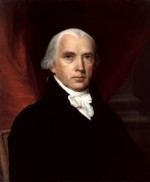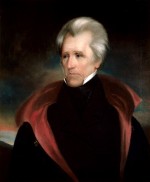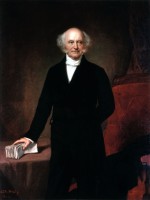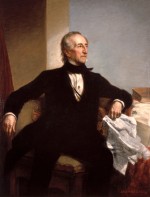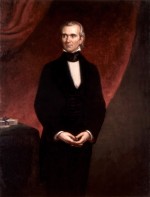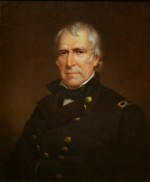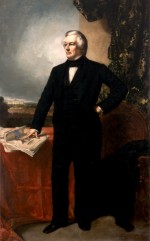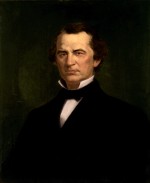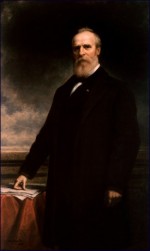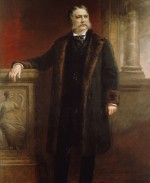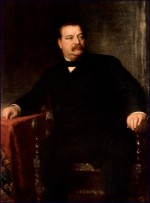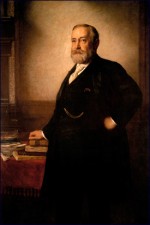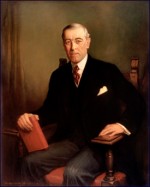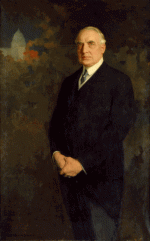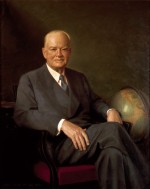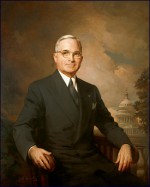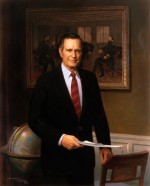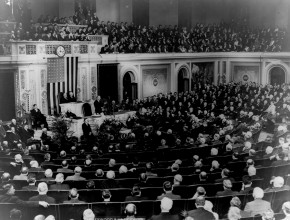Presidents Day

The federal holiday honoring George Washington began in 1880 in the District of Columbia and expanded in 1885 to include all of the Federal Government. It was celebrated on Washington’s birthday, February 22. In 1971 the holiday was shifted to the third Monday in February and as such never falls on Washington’s actual birthday.
In the 1980s the term “Presidents Day” began its public appearance. Although Lincoln’s birthday, February 12, was never a federal holiday, approximately a dozen state governments have officially renamed their Washington’s Birthday observances as “Presidents Day”, “Washington and Lincoln Day”, such as Utah, or other such designations.
Collected herein is a quote from each president about government. Do you have a favorite?

George Washington
(1789–1797)“I entertain a strong hope that the state of the national finances is now sufficiently matured to enable you to enter upon a systematic and effectual arrangement for the regular redemption and discharge of the public debt, according to the right which has been reserved to the Government.”
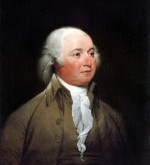
John Adams
(1797–1801)“Our Constitution was made only for a moral and religious people. It is wholly inadequate to the government of any other.”
Thomas Jefferson
(1801–1809)“A Bill of Rights is what the people are entitled to against every government, and what no just government should refuse, or rest on inference.”
James Monroe
(1817–1825)“The best form of government is that which is most likely to prevent the greatest sum of evil.”
John Quincy Adams
(1825–1829)“The highest glory of the American Revolution was this: it connected in one indissoluble bond the principles of civil government with the principles of Christianity.”
Andrew Jackson
(1829–1837)“As long as our government is administered for the good of the people, and is regulated by their will; as long as it secures to us the rights of persons and of property, liberty of conscience and of the press, it will be worth defending.”
Martin Van Buren
(1837–1841)“The less government interferes with private pursuits, the better for general prosperity.”
William Henry Harrison
(1841)“I contend that the strongest of all governments is that which is most free.”
John Tyler
(1841–1845)“So far as it depends on the course of this government, our relations of good will and friendship will be sedulously cultivated with all nations.”
Zachary Taylor
(1849–1850)“In any action calculated to promote an object so near the heart of everyone who truly loves his country I will zealously unite with the coordinate branches of the Government.”
Millard Fillmore
(1850–1853)“God knows that I detest slavery, but it is an existing evil, for which we are not responsible, and we must endure it, till we can get rid of it without destroying the last hope of free government in the world.”
Franklin Pierce
(1853–1857)“The dangers of a concentration of all power in the general government of a confederacy so vast as ours are too obvious to be disregarded.”
James Buchanan
(1857–1861)“The distribution of patronage of the Government is by far the most disagreeable duty of the President.”
Abraham Lincoln
(1861–1865)“Government of the people, by the people, for the people, shall not perish from the Earth.”

Ulysses Grant
(1869–1877)“When people are oppressed by their government, it is a natural right they enjoy to relieve themselves of oppression, if they are strong enough, whether by withdrawal from it, or by overthrowing it and substituting a government more acceptable.”
Rutherford Hayes
(1877–1881)“There can be no complete and permanent reform of the civil service until public opinion emancipates congressmen from all control and influence over government patronage.”
James Garfield
(1881)“It is no part of the functions of the National Government to find employment for the people, and if we were to appropriate a hundred millions for his purpose, we should only be taxing 40 millions of people to keep a few thousand employed.”
Chester Arthur
(1881–1885)“…there has been substantial accord in the doctrine that only such taxes ought to be levied as are necessary for a wise and economical administration of the Government.”
Grover Cleveland
(1885–1889 & 1893–1897)“It is the responsibility of the citizens to support their government. It is not the responsibility of the government to support its citizens.”
Benjamin Harrison
(1889–1893)“No other people have a government more worthy of their respect and love or a land so magnificent in extent, so pleasant to look upon, and so full of generous suggestion to enterprise and labor.”
William McKinley
(1897–1901)“Unlike any other nation, here the people rule, and their will is the supreme law. It is sometimes sneeringly said by those who do not like free government, that here we count heads. True, heads are counted, but brains also…”

Theodore Roosevelt
(1901–1909)“Behind the ostensible government sits enthroned an invisible government owing no allegiance and acknowledging no responsibility to the people.”
Woodrow Wilson
(1913–1921)“Liberty has never come from the government. Liberty has always come from the subjects of the government. The history of liberty is a history of resistance. The history of liberty is a history of the limitation of governmental power, not the increase of it.”
Warren Harding
(1921–1923)“Our most dangerous tendency is to expect too much of government, and at the same time do for it too little.”
Calvin Coolidge
(1923–1929)“The men and women of this country who toil are the ones who bear the cost of the Government. Every dollar that we carelessly waste means that their life will be so much the more meager.”
Herbert Hoover
(1929–1933)“When there is a lack of honor in government, the morals of the whole people are poisoned.”
Franklin Roosevelt
(1933–1945)“They (who) seek to establish systems of government based on the regimentation of all human beings by a handful of individual rulers… call this a new order. It is not new and it is not order.”
Harry Truman
(1945–1953)“The external threat to liberty should not drive us into suppressing liberty at home. Those who want the Government to regulate matters of the mind and spirit are like men who are so afraid of being murdered that they commit suicide to avoid assassination.”
Dwight Eisenhower
(1953–1961)“In the councils of government, we must guard against the acquisition of unwarranted influence, whether sought or unsought, by the military-industrial complex.”
John Kennedy
(1961–1963)“It requires a change in outlook, a change in tactics, a change in missions — by the government, by the people, by every businessman or labor leader, and by every newspaper. For we are opposed around the world by a monolithic and ruthless conspiracy that relies primarily on covert means for expanding its sphere of influence.”
Lyndon Johnson
(1963–1969)“If government is to serve any purpose it is to do for others what they are unable to do for themselves.”
Richard Nixon
(1969–1974)“I don’t think a woman should be in any government job whatever. I mean, I really don’t. The reason why I do is mainly because they are erratic. And emotional.”
Gerald Ford
(1974–1977)“A government big enough to give you everything you want is a government big enough to take from you everything you have.”
Jimmy Carter
(1977–1981)“The government and the church are two different realms of service, and those in political office have to face a subtle but important difference between the implementation of the high ideals of religious faith and public duty.”
Ronald Reagan
(1981–1989)“We are a nation that has a government — not the other way around. And that makes us special among the nations of the earth.”
George H. W. Bush
(1989–1993)“…the heroic actions of our veterans, the lifesaving work of our scientists and physicians, and generosity of countless individuals who voluntarily give of their time, talents, and energy to help others — all have enriched humankind and affirmed the importance of our Judeo-Christian heritage in shaping our government and values.”
Bill Clinton
(1993–2001)“Criticism is part of the lifeblood of democracy. No one is right all the time. But we should remember that there is a big difference between criticizing a policy or a politician and demonizing the government that guarantees our freedoms and the public servants who enforce our laws.”
George W. Bush
(2001–2009)“Ages of experience have taught us that the commitment of a husband and wife to love and to serve one another promotes the welfare of children and the stability of society. Government, by recognizing and protecting marriage, serves the interests of all.”
Barack Obama
(2009–)“In Africa, you often see that the difference between a village where everybody eats and a village where people starve is government. One has a functioning government, and the other does not. Which is why it bothers me when I hear people say that government is the enemy. They don’t understand its fundamental role.”
The Presidents Series


